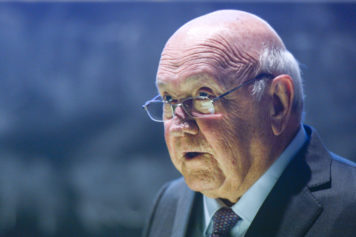After Nelson Mandela was hospitalized yesterday in Pretoria, South African President Jacob Zuma felt it necessary to issue a statement assuring South Africans and the rest of the world that Mandela, 94, would be fine and there was no cause for alarm.
Such is the standing of the man his people like to call Madiba, a heroic figure who has taken on the role of the world’s conscience, a man that leaders across the globe seek out when they are desperate for guidance from a figure about as close as we get to a living saint.
Leaders like Mandela seem to happen only a few times in a century. Gandhi. Mother Teresa. Martin Luther King Jr. Dalai Lama. People whose courage, intellect, vision, esteem and moral conviction are so superior that they leave the rest of us mortals in awe. These are people whose every utterance can move nations, spur armies to lay down arms, bring sworn enemies to the table.
Mandela was born to lead—his great-grandfather was king of the Thembu people; his father was chief of the town of Mveso before the family was exiled to Qunu. As a leader of the radical ANC fighting against the viciously racist system of apartheid, Mandela first tried to use the methods of nonviolent resistance that Gandhi had employed in South Africa and later in India. When those failed to move the Afrikaner government, Mandela and his colleagues resorted to acts of sabotage—bombing and burning property, but never harming individuals. At his trial in 1964, he and his colleagues were charged with 193 acts of sabotage against the government.
Mandela’s certitude about his fight against apartheid was clear, as evidenced by this statement he made at his trial: “During my lifetime I have dedicated myself to the struggle of the African people. I have fought against white domination, and I have fought against black domination. I have cherished the ideal of a democratic and free society in which all persons live together in harmony and with equal opportunities. It is an ideal which I hope to live for and to achieve. But if needs be, it is an ideal for which I am prepared to die.”
He was sentenced to life in prison on June 12, 1964, and sent to Robben Island. During his time there, his reputation grew—he was eventually thought of as the most significant black leader in South Africa. In fact, when he was moved in 1982 along with a few other senior ANC leaders like Walter Sisulu and Andrew Mlangeni from Robben to Pollsmoor Prison, many speculated that it was because he was having too great an influence on the next generation of black leaders at Robben, which many were calling “Mandela University.”
During this time, freeing Mandela and ending the brutal system of apartheid had become popular global causes, increased in importance and urgency through songs, massive protests and loud calls across the world for divestiture from companies that profited from business with South Africa.
South Africa President P.W. Botha offered Mandela his freedom in February 1985, but only on the condition that he “unconditionally rejected violence as a political weapon.” Mandela refused, releasing a statement through his daughter Zindzi that said, “What freedom am I being offered while the organisation of the people remains banned? Only free men can negotiate. A prisoner cannot enter into contracts.”
To most observers and activists inside and outside of South Africa, it was hard to envision an end to apartheid coming without massive violence and bloodshed. But that’s largely what happened—though there were pockets of violence and several ugly massacres of protesters. After Botha suffered a stroke, he was replaced by President Frederik Willem de Klerk, who announced Mandela’s release in February 1990. In 1991, Mandela was elected head of the ANC. In 1993, Mandela and de Klerk were awarded the Nobel Peace prize.
Mandela served as President of South Africa from May 1994 until June 1999, stunning the world by skillfully transitioning the nation out of minority apartheid rule. Since the end of his presidency, Mandela has become one of the most esteemed leaders in the world, in a sense almost a global president. Whenever he has had health issues, the entire world has held its breath until receiving word of his recovery.
This time, President Jacob Zuma reassured South Africans in a statement that there was no cause for alarm.
“Former President Mandela will receive medical attention from time to time which is consistent with his age. President Zuma assures all that Madiba is doing well and there is no cause for alarm,” the statement said.
“The medical team is assured of our support as they look after and ensure the comfort of our beloved founding president of a free and democratic South Africa,” Zuma said in the statement.
In 2011, Mandela had to be hospitalized for a respiratory infection. In February this year he was hospitalized for minor diagnostic surgery related to an abdominal complaint.
Once again, the world anxiously awaits word of his emergence from danger.

